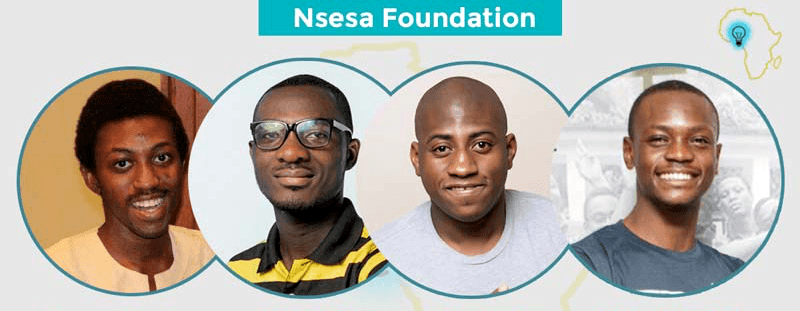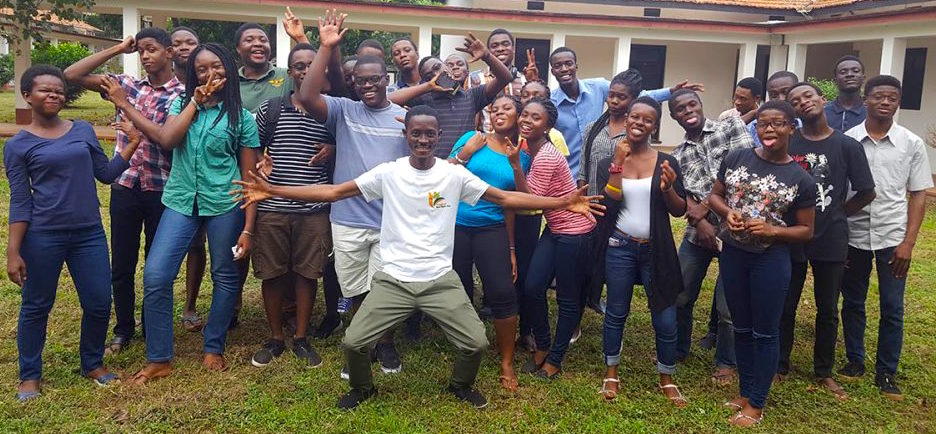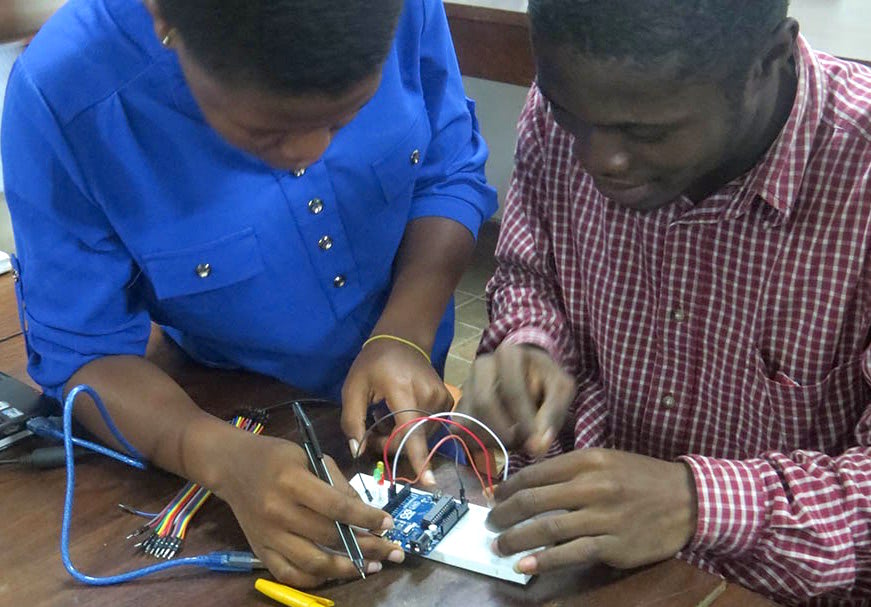- Undergraduate
Bachelor's Degrees
Bachelor of ArtsBachelor of EngineeringDual-Degree ProgramUndergraduate AdmissionsUndergraduate Experience
- Graduate
Graduate Experience
- Research
- Entrepreneurship
- Community
- About
-
Search
All Thayer News
Ghana's Adaptation of Dartmouth's Intro to Engineering Course is Flourishing in its 4th Year
Sep 14, 2017
In 2013, George Boateng '16 Th'17 created an abbreviated version of Thayer School’s signature introductory engineering course—ENGS 21—for high school students in his home country of Ghana. He called it Project iSWEST (Innovating Solutions with Engineering, Science & Technology) and founded a non-profit, Nsesa Foundation, with six Ghanaian friends to run the program—a three-week summer intensive innovation bootcamp. The pilot was successful enough to attract funding from Thayer as well as from Dartmouth’s Institute for Security, Technology and Society (ISTS) and Neukom Institute.

The Nsesa Foundation team (l to r): George Boateng '16 Th'17, President; Isaac Sesi, VP of Operations; John Kotey, VP of Development; Victor Kumbol, VP of Finance & Administration
"The thing that blew my mind about [ENGS 21] was that students without advanced engineering classes could go through a design and innovation process and actually build solutions to real-life problems and start companies out of it," Boateng says.
Now in its fourth year taking place at the University of Ghana in Legon, Project iSWEST has steadily grown and offered free admission to girls in order to boost their enrollment which rose from two to ten out of this year's 27 students. (See "Nsesa Foundation Ends Project iSWEST 2017 with a Blast!")

Twenty-seven students (17 boys and 10 girls) from high schools across the country participated in this year’s edition.
"This summer marks the fourth year of project iSWEST's work to inspire the youth of Ghana to believe that they have the capacity to be innovative as well as to empower them to develop solutions to the problems within their own communities," said Joseph Helble, Dean and Professor of Engineering at Dartmouth, when presenting Boateng with the 2017 Thayer School Dean’s Service Award.
"Our vision is to inspire an innovation revolution for youth across Africa to create solutions to their communities’ problems," says Boateng, who completed his AB in computer science modified with engineering and his MS in computer engineering, and is now both a Research Scientist in Dartmouth's Department of Computer Science and a tutor in Thayer School's "Dartmouth Emerging Engineers" program.
In a first for Ghana, Project iSWEST's curriculum allows students without access to full-size laptops to code on their smartphones. The program features training not only in programming and Arduino micro-controllers but also in innovation and entrepreneurship, and includes mentoring sessions with US-based African professionals in the tech sector.
This year, four teams of students presented ideas, prototypes, and business models for solutions to problems in Ghana’s agriculture sector:
- Paragon presented AQuarius: a smart irrigation device for greenhouse farmers;
- Genius 5 presented Farmerton: an online organic grocery store for health-conscious consumers;
- AgroModo presented DuaYie: a personalised virtual Agric extension service for local farmers;
- AQUAtech presented StemAq: a smart fish pond management system for fish farmers.
Over the past 4 years, Project iSWEST has directly impacted 100 students and its alumni have won 10 national awards for their ventures.
What's next for the program? "We'd like to secure funding for some of the students to visit Dartmouth and benefit from the facilities and expertise here," says Boateng. "And we've started forming innovation clubs, called 'N-Clubs,' at African universities where our alumni can continue taking their problem solving skills to the next level."

Students working together to build a circuit with an Arduino board.
For contacts and other media information visit our Media Resources page.
